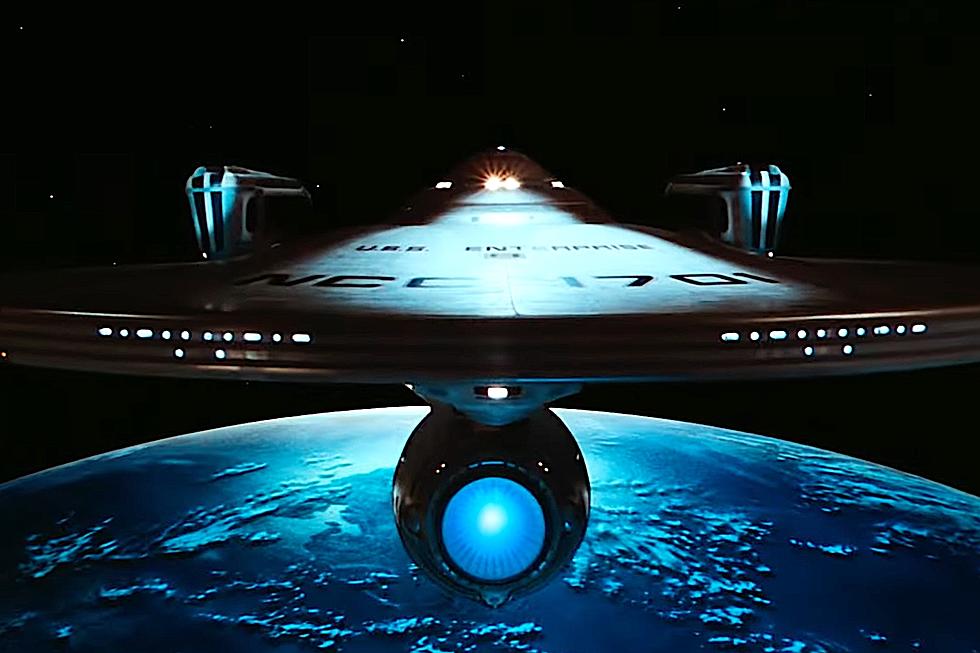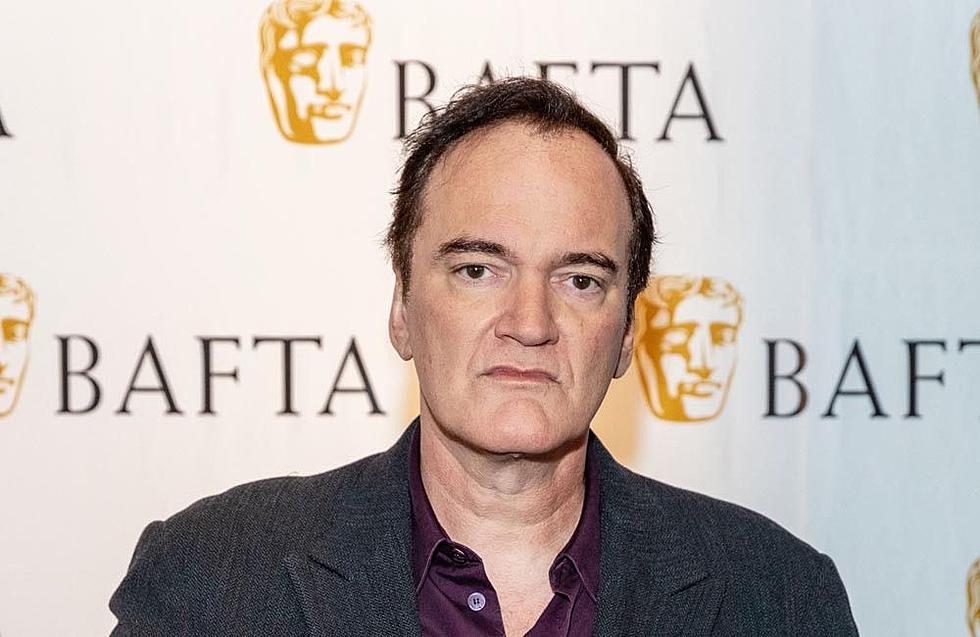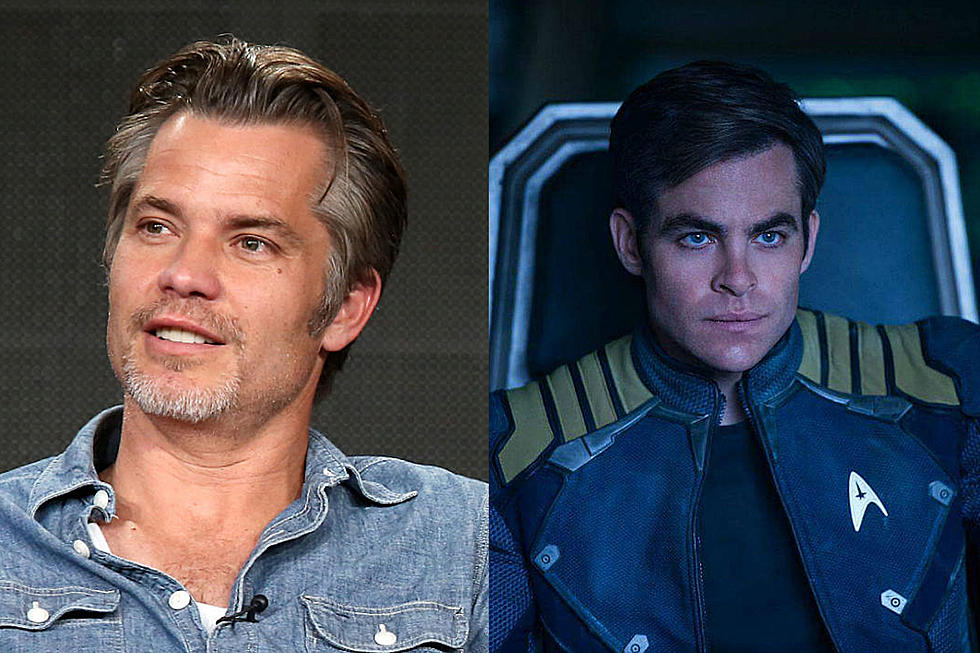
‘Star Trek Into Darkness’ – Everything a Newbie Needs to Know About the ‘Star Trek’ Universe
With 'Star Trek Into Darkness' in theaters this week, millions of people are going to pay a visit to an iconic, half-century-old franchise. Like the last film, many of them are going to enjoy it and will want to know more. How does this universe tick? Where did these characters come from? Where do you go next if you want to delve deeper into 'Star Trek'?
Fret not! We've got you covered!
The world of 'Star Trek' can occasionally seem nerdy, dense and difficult to outsiders and that's because...uh...it often is. However, all you need to get started is a quick primer. This one is for the non-fans, the new fans and the folks just wanting the most basic, fat-free overview of the 'Star Trek' universe/franchise possible. By the end of this guide, you'll know if becoming a Trekkie full time is the right choice for you!
- 1
The 'Star Trek' Universe
Let's star from the top, shall we? 'Star Trek' premiered on CBS back in 1966, the brainchild of creator Gene Roddenberry. Pitched as "Wagon Train to the stars," the show followed the crew of the USS Enterprise as they explored the galaxy, encountering fascinating and frequently hostile alien lifeforms. Although the show fluctuated in quality (the third season is particularly atrocious), it established a fascinating and groundbreaking science fiction world. The future seen in 'Star Trek' felt radical in the '60s: men and women of all races and nationalities working together for the greater good. The idea of mankind standing together and striving toward a humanistic ideal underscores almost every episode and film in the 'Star Trek' canon. Above all, this is a universe that is defined by its optimism.
CBSCBS - 2
World War III and Super Soldiers and First Contact and…
However, the hopeful, progressive utopia of 'Star Trek' didn't come out of nowhere -- it had to rise out of the ashes of ruined civilization. Depending on which movie or show you're watching, massive global conflict enveloped that world in either the 1990s (ha!) or the mid 21st century, sending the world into a tailspin. Despotic, genetically enhanced warlords like Khan Noonien Singh (yes, that name should ring a bell) ruled over entire nations and millions of people died. Enter Zefram Cochrane (memorably played by James Cromwell in 'Star Trek: First Contact'), an engineer who transforms a nuclear missile into a spaceship, invents warp drive and makes first contact with an alien species. From the wreckage of the world, Cochrane would help humanity rise to its feet and become greater than they had ever been before.
ParamountParamount - 3
Starfleet and the Federation
Let's jump forward a few centuries. The human race has got its act together. Space travel is a thing. Colonies have been established on the Moon and on Mars. In the year 2161, Earth helps found the United Federation of Planets, a group of 150 (and constantly growing) planets and civilizations that agree to work together and operate under a single umbrella government. The Federation is protected and its policies enacted by Starfleet, an organization dedicated to exploration, scientific discovery and, when necessary, military intervention. Based on Earth (with its training academy in San Francisco), Starfleet is the actual organization that the main characters in every 'Star Trek' movie and show actually work for.
ParamountParamount - 4
The Prime Directive
Like any governing body, the Federation has its fair share of rules and regulations. However, there is one law that stands above every other and has been the source of much conflict in every 'Star Trek' series (and a few movies, including 'Star Trek Into Darkness'). It's the Prime Directive, which states that Starfleet personel can never, under any circumstances, interfere or assist in the development of pre-warp civilizations. This means that a people without technology matching the Federation and its allies are not to be meddled with or assisted in any way, just in case doing so will alter or ruin their growth as a species. If this sounds like it will lead to a lot of juicy, dramatic conflict, you're absolutely right.
CBSCBS - 5
The Crew(s)
Despite doing their jobs in outer space, Starfleet crews function very much like they're in the modern Navy. Each ship has a Captain (who reports to the admirals). He has a First Officer working directly under him, helmsmen to navigate the ship, communication officers to intercpet and translate messages and engineers to keep the ship together. However, 'Star Trek' crews have always been more than a series of roles in a military-style organization. The best cast shows and films mix and match wonderful and conflicting personalities in every ship's role, creating unique friendships and rivalries. For example: has there ever been a better working relationship than that of Captain Kirk, Mr. Spock and Dr. McCoy?
CBSCBS - 6
The USS Enterprise
Every crew needs a ship and in the 'Star Trek' universe, there is no greater honor than serving on board the USS Enterprise. Of course, there have been many, many versions of the Enterprise over the centuries, but they all have on thing in common: they are always the fleet's flagship. The Enterprise seen in the original series (and JJ Abrams' films) is the Enterprise NCC-1701. While it's the first introduced and most famous of the Enterprises, it's not the first. Earth constructed a few Enterprises before the days of the Federation and the most notable of them is the Enterprise NX-01, the setting for the series 'Star Trek: Enterprise.' Over the years, other ships would bear the name. The Enterprise NCC-1701-A would be introduced in 'Star Trek IV: The Voyage Home,' the NCC-1701-B in 'Star Trek: Generations,' the NCC-1701-C and D in 'Star Trek: The Next Generation' and the NCC-1701-E in 'Star Trek: First Contact.'
CBSCBS - 7
Aliens Races to Know
Even people who have never seen an episode of 'Star Trek' know about the Vulcans, the pointy-eared alien race who value logic above all else. However, they're just one of countless alien races featured in the franchise. You should know about the Klingons, the warrior race who began as a metaphor for the Soviet Union but evolved into a honorable Federation ally later on. You should know about the Romulans, a devious and tricky people who battle the Federation with deceit, espionage and politics. You should know about the Borg, a bio-mechanical hive mind that exterminates entire planets and forces survivors to join their ranks. You should know about the Ferengi, a Capitalistic race that has built their entire civilization around finding ways to make a profit. And finally, you should know about the Gorn, a race that has only ever made one appearance in the entire series but was so memorable that no one ever forgets them (see the image below).
CBSCBS - 8
How Do the Movies and Shows Fit Together?
One of the reasons that many non-fans find 'Star Trek' so impenetrable is the sheer amount of it. There are so many movies and individual shows that knowing where to start or how it all fits together can seem confusing. We'll get to where to start (and not start) in a moment, but in the meantime, here's how all of it fits together in chronological order. 'Star Trek: Enterprise' is the last produced of the shows, but it takes place first, following Captain Archer (Scott Bakula) and his crew in the days before the Federation. The original series (and the new films) take place about a century after that and follows Captain Kirk as he explores the galaxy, going where no man has gone before. After that, the events of the first six 'Star Trek' films take place, with the 'Star Trek: The Next Generation' TV series picking up about seventy years after that. From here on out, 'Star Trek: Deep Space Nine,' 'Star Trek: Voyager' and the remaining films take place at roughly the same time.
CBSCBS - 9
Where to Start
Okay, so you've made it this far and haven't decided to flee quite yet. Congratulations! You're ready to jump into the world of 'Star Trek.' But where do you start? If you have thick skin, you could try watching all of the shows straight through, but you'll have to endure some rough starts and awful television to get to the good stuff. If you want a taste of the original series, you can't go wrong with the heartbreaking "The City on the Edge of Forever," the awesome/cheesy "Arena" or the thrilling "Balance of Terror." Also, double feature of the episode "Space Seed' and the film 'Star Trek II: The Wrath of Khan' will give you a perfect taste of the series and the films in a single sitting. If you want to forego the '60s stuff (you fool!), 'Star Trek: The Next Generation' has plenty of approachable, stand-alone episodes. We'd recommend "Yesterday's Enterprise," "The Inner Light," "Cause and Effect," "Measure of a Man" and "The Best of Both Worlds."
ParamountParamount - 10
What to Avoid
Once you've seen some good stuff and know what you're getting, it should be easy enough to jump right into the original series and most of the related films...although skipping 'Star Trek: The Motion Picture' and 'Star Trek V: The Final Frontier' is encouraged. It's a bit trickier with the 'Next Generation' -- the show starts off pretty awful but steadily improves, finally becoming excellent television in season three. The first season of 'Next Generation' is a challenge for dedicated fans and should be avoided if you're new to all of this. The same goes for the films, which range from okay to abysmal and should only be watched after you've exhausted the TV series. The other shows also have odd entry points of their own. 'Star Trek: Deep Space Nine' eventually becomes the best 'Trek' series of them all (seriously), but it has a rough start and doesn't get good for awhile. Unlike 'The Next Generation' though, it's hard to jump around since it's the most heavily serialized of 'Trek' shows. Meanwhile, 'Star Trek: Enterprise' stars off rather fully formed -- it's just a matter of whether or not it's your cup of tea.
And you know what? Just skip 'Star Trek: Voyager' altogether.
ParamountParamount
More From ScreenCrush









